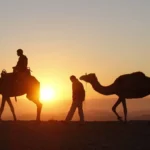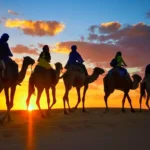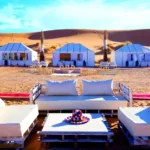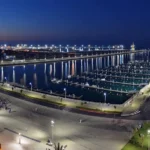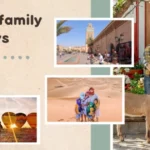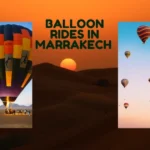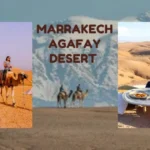Table of Contents
Standing in the middle of the Djemaa el-Fna for the first time is a beautiful sensory overload. But without the right prep, it can be just… overload. This guide gives you the practical information for traveling to Morocco and the on-the-ground Morocco travel advice you need to navigate Morocco like a seasoned traveler.
Quick Reference: Essential Practical Information for Traveling to Morocco
| Topic | Quick Answer |
|---|---|
| Visa? | Not required for US/EU/UK citizens for stays up to 90 days |
| Currency? | Moroccan Dirham (MAD). Cash is king, especially in souks |
| Tap Water? | Not recommended for drinking. Stick to bottled water |
| Language? | Arabic & Berber. French widely spoken. English in tourist areas |
| Power Adapter? | Type C / E (Standard European) |
| Best Time to Visit? | Spring (March-May) and Fall (September-November) |
| Safety Level? | Generally safe with standard precautions |
| Tipping Expected? | Yes, 10-15% in restaurants, small amounts for services |
Morocco travel tips: Before You Even Pack
Visas & Entry Requirements
For most travelers, Morocco makes entry remarkably straightforward. Citizens from the United States, European Union, United Kingdom, Canada, and Australia can enter Morocco visa-free for up to 90 days. Your passport must be valid for at least six months from your entry date.
Upon arrival, you’ll receive an entry stamp and potentially a small paper form to keep with your passport. Don’t lose this, you’ll need it when departing. For the most current visa requirements, always check the official Moroccan Ministry of Foreign Affairs website before traveling.
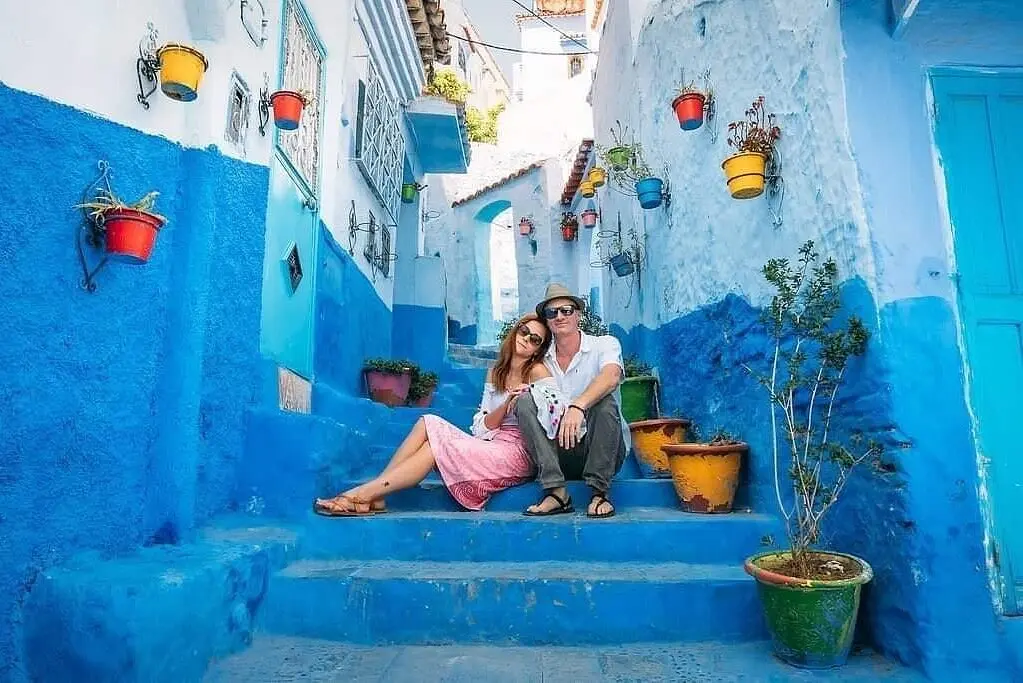
The Best Time to Visit Morocco (And Why)
Morocco’s diverse geography means timing matters significantly depending on your destination:
Spring (March-May): Perfect for most regions. Mild temperatures, blooming landscapes, and comfortable desert conditions. This is peak season for good reason.
Fall (September-November): Another excellent window. Post-summer cooling with warm days and pleasant evenings. Ideal for combining coast, mountains, and desert.
Winter (December-February): Great for southern regions and desert areas, but mountain passes may be snow-covered. Coastal cities remain mild but can be rainy.
Summer (June-August): Extremely hot in inland areas and the desert. Coastal cities like Casablanca and Rabat remain bearable due to ocean breezes.
Travel Insurance Is Non-Negotiable
Morocco travel insurance should cover:
- Medical emergencies and evacuation
- Trip cancellation/interruption
- Theft and loss of belongings
- Adventure activities, if you’re planning desert treks or mountain hiking
Look for policies that specifically cover Morocco and include 24/7 assistance. Many standard policies exclude certain activities common in Morocco, so read the fine print.
Booking Flights & Accommodation: Riad Selection Tips
When booking a traditional riad (Moroccan house with an interior courtyard), consider:
- Location within the medina: Closer to the main squares means more noise, but easier navigation
- Roof terrace access: Essential for sunset views and cooler evening air
- Airport transfer included: Many riads offer this valuable service
- Breakfast quality: Moroccan breakfasts can be a highlight of your stay
- Hot water reliability: Especially important in winter months
Tech & Connectivity: e-SIM vs. Local SIM Card
e-SIM Option: Convenient for newer phones. Services like Airalo offer Morocco data plans starting around $4.50 for 1GB. Perfect for short trips.
Local SIM Card: More economical for longer stays. Major operators include:
- Maroc Telecom: Best coverage, especially in rural areas
- Orange Morocco: Good urban coverage, competitive prices
- Inwi: Budget-friendly option
Expect to pay 50-100 MAD ($5-10) for a SIM with a decent data allowance. You’ll need a passport ID for registration.
Money, Haggling, and Scams: Navigate Like a Local
Currency Deep Dive (Morocco currency)
The Moroccan Dirham (MAD) is a closed Morocco currency, meaning you can’t obtain it before arriving. Here’s what you need to know:
ATM Strategy: Use bank-affiliated ATMs (BMCE, Attijariwafa Bank) for better rates and security. Expect 15-30 MAD withdrawal fees plus your bank’s international charges.
Typical Costs:
- Street food meal: 15-25 MAD
- Restaurant dinner: 80-150 MAD per person
- Taxi across town: 20-40 MAD
- Hotel room (mid-range): 400-800 MAD per night
- Souk souvenir: 50-200 MAD (after haggling)
Cash is King: Especially in souks, small restaurants, and for tips. Credit cards work in upscale establishments but aren’t universally accepted.
The Art of Haggling in Morocco: A 3-Step Process
Haggling in Morocco isn’t just expected, it’s part of the cultural experience. Here’s your framework:
Step 1: Get a Baseline Price. Visit 2-3 shops selling similar items to understand the range. Don’t buy immediately; just observe and ask about prices.
Step 2: The Opening Gambit
- Start at 30-40% of the asking price
- Remain friendly and respectful
- Show genuine interest in the item
- Be prepared to walk away
Step 3: The Dance
- Expect multiple counteroffers
- Meet somewhere in the middle
- Don’t be afraid to say “no, thank you” and leave
- Often, you’ll be called back with a better price
Pro Tip: Learn basic Arabic numbers and the phrase “La, shukran” (No, thank you). This shows respect and often leads to better prices.
Common Tourist Scams & How to Avoid Them
The “Helpful Local” Scam: Someone approaches offering directions, then leads you to a shop where they expect commission. Politely decline unsolicited help and use your phone’s GPS.
The Tannery Scam: Guides demand payment after “free” tannery tours. Agree on prices upfront or skip guided tours altogether.
Taxi Meter Issues: Ensure the meter is running or agree on a price before starting. In smaller cities, fixed prices are common and reasonable.
The “Closed Today” Trick: Fake guides claim your planned destination is closed and offer alternatives. Verify independently or continue to your original destination.
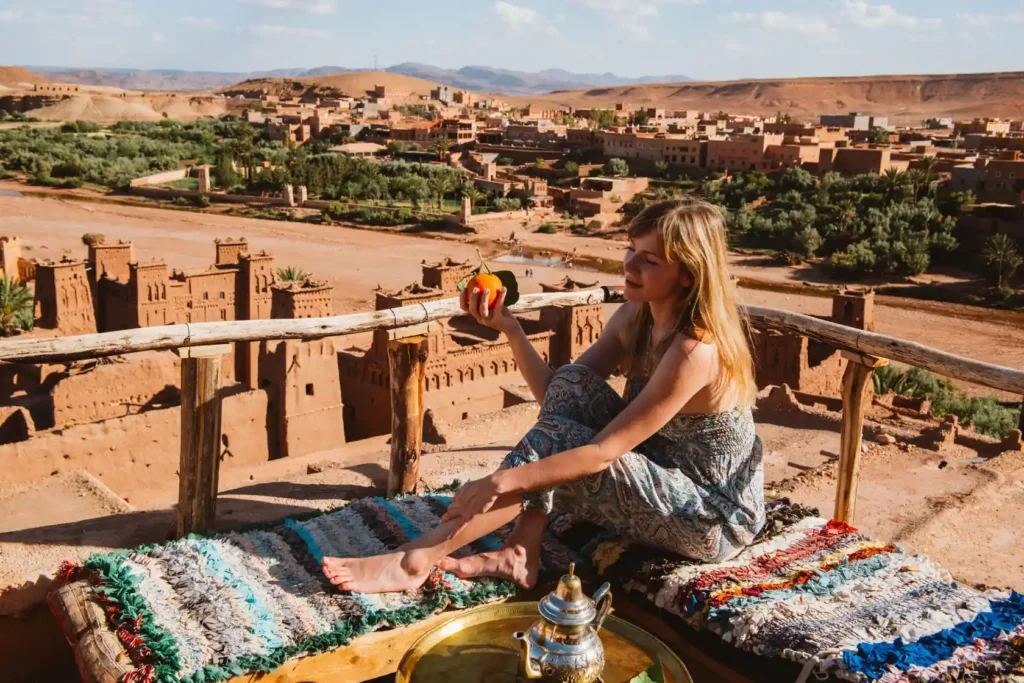
Culture, Etiquette, and What to Wear in Morocco
The Dress Code Demystified
Dressing appropriately in Morocco shows respect and helps you blend in:
For Women:
- Cover your shoulders and knees in public
- Loose-fitting clothes work best
- Scarves are useful for visiting mosques
- Swimwear is fine at beaches and hotel pools
For Men:
- Avoid shorts in cities (fine at beaches)
- T-shirts are acceptable, but polo shirts are better
- Long pants for evening dining
- Remove your shoes when entering homes or mosques
Universal Tips:
- Dress more conservatively in smaller towns
- Cities like Casablanca are more relaxed
- Quality fabrics help with the heat
- Comfortable walking shoes are essential
Greetings & Basic Phrases
| Arabic | French | English | Pronunciation |
|---|---|---|---|
| As-salamu alaykum | Bonjour | Hello | As-sa-LAH-mu ah-LAY-kum |
| Shukran | Merci | Thank you | SHUK-ran |
| Afwan | De rien | You’re welcome | AF-wan |
| Ma’a salama | Au revoir | Goodbye | MAH-ah sa-LAH-ma |
| Kam hada? | C’est combien? | How much? | KAM ha-DAH? |
| La, shukran | Non, merci | No, thank you | LAH, SHUK-ran |
The Mint Tea Ceremony: What to Expect
Moroccan mint tea (atay) is more than a beverage; it’s a social ritual. When offered tea:
- Accept graciously; refusing can be considered rude
- The tea is very sweet; this is normal
- Three glasses are traditional: the first is gentle, the second is strong, and the third is smooth
- Take your time; rushing through tea is impolite
- The host will pour from a height to create foam. This is a skill, not showing off
Photography Etiquette
Always ask permission before photographing people, especially:
- Women in traditional dress
- Elderly men
- Children
- People at work in the markets
Monetary expectations: Some people may expect a small tip (5-10 MAD) for photos, especially in touristy areas.
Forbidden photos: Military installations, police, and some government buildings. When in doubt, ask.
Health, Safety, and Food: Stay Healthy and Enjoy
Is Morocco Safe? A Realistic Look (Morocco travel advice)
Morocco is generally safe for travelers, including solo female travelers, with standard precautions:
Overall Safety Level: Morocco has a strong tourism police presence and generally low violent crime rates. Petty theft exists but isn’t rampant.
Solo Female Travel Tips:
- Dress conservatively to avoid unwanted attention
- Stay in well-reviewed accommodations
- Use official tour guides or reputable companies
- Trust your instincts about situations and people
- Consider joining group activities for desert or mountain excursions
Common Sense Precautions:
- Don’t flash expensive electronics or jewelry
- Use hotel safes for valuables
- Stay in well-lit, populated areas at night
- Keep copies of important documents separately
- Have emergency contacts readily available
Food Safety: The “Cooked, Boiled, or Peeled” Rule
Moroccan cuisine is incredible, but food safety requires attention:
Safe Choices:
- Freshly cooked, hot food
- Bottled water (brands like Sidi Ali or Ain Saiss)
- Fruits you can peel yourself
- Well-cooked meat and vegetables
- Pastries from busy bakeries
Avoid:
- Tap water (including ice cubes)
- Raw vegetables and salads
- Undercooked meat
- Dairy products from unknown sources
- Street food that’s been sitting out
Stomach Remedy Kit: Pack anti-diarrheal medication, rehydration salts, and probiotics. Most pharmacies stock international brands.
The Ultimate Moroccan Food Checklist
Must-Try Dishes:
| Dish | Description | Where to Find |
|---|---|---|
| Tagine | Slow-cooked stew in conical clay pot | Everywhere, but best in local restaurants |
| Couscous | Steamed semolina with vegetables/meat | Friday traditional meal |
| Pastilla | Sweet-savory pastry with meat/nuts | Upscale restaurants in Fez |
| Harira | Hearty tomato-lentil soup | Street vendors, especially during Ramadan |
| B’ssara | Fava bean soup | Breakfast spots |
| Mechoui | Slow-roasted lamb | Special occasion restaurants |
| Chebakia | Honey-sesame cookies | Bakeries and street vendors |
| Mint Tea | Sweet green tea with fresh mint | Everywhere |
Getting Around: Master Morocco’s Transportation
Navigating the Medinas (Without Getting Lost)
Medinas (old city centers) can be maze-like, but they’re navigable:
Essential Tips:
- Download offline maps before entering
- Use major landmarks as reference points
- Main squares (like Djemaa el-Fna) are usually central
- Ask shopkeepers for directions, they’re usually helpful
- Consider a local guide for your first exploration
- Remember: getting “lost” often leads to the best discoveries
Navigation Apps: Maps.me works well offline, and Google Maps has decent Medina coverage in major cities.
Taxis: Petit vs. Grand
Petit Taxis (small taxis):
- Operate within city limits only
- Maximum 3 passengers
- Should use meters (insist on this)
- Typical ride: 10-30 MAD
- Can’t travel between cities
Grand Taxis (large taxis):
- Shared vehicles for longer distances
- Usually, old Mercedes sedans
- Seat 6 passengers (can be crowded)
- Negotiate the price before departure
- Depart when full
Taxi Tips:
- Have small bills ready
- Learn basic destination names in Arabic
- Use ride-sharing apps like Careem in major cities
- Don’t accept rides from unlicensed drivers at airports
Train Travel: The Superior Way to Go Long Distance
Morocco’s train system (ONCF) is efficient and comfortable:
Major Routes:
- Casablanca ↔ Marrakech: 3 hours
- Casablanca ↔ Rabat: 1 hour
- Casablanca ↔ Fez: 4 hours
- Tangier ↔ Casablanca: 2 hours 45 minutes
Ticket Classes:
- First Class: Air-conditioned, reserved seating, more spacious
- Second Class: Basic but comfortable, cheaper option
Booking Tips:
- Book online at oncf-voyages.ma
- Buy tickets at stations up to 5 days in advance
- Consider first class for longer journeys
- Bring snacks and water
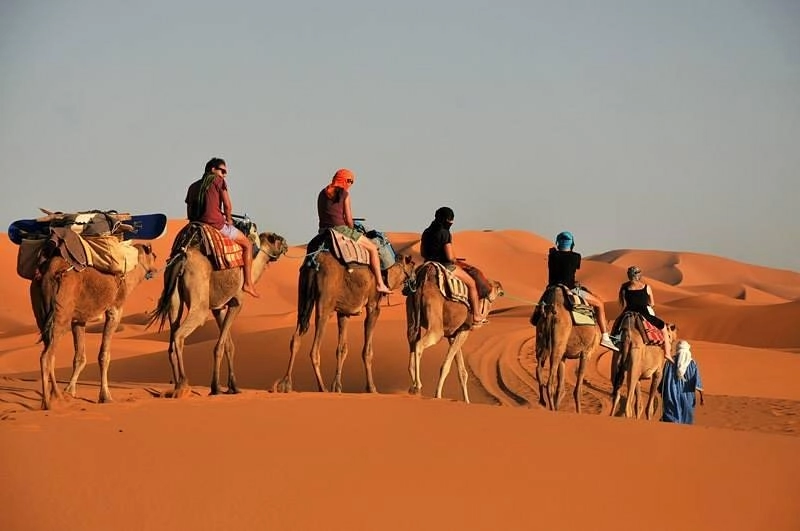
Frequently Asked Questions: Practical Information for Traveling to Morocco
Can you drink alcohol in Morocco?
Yes, alcohol is available but regulated. You can purchase beer, wine, and spirits at licensed restaurants, hotels, and some grocery stores. Respect local customs by not drinking in public spaces or during Ramadan daylight hours.
What should I not miss in Morocco?
Essential experiences include exploring Marrakech’s medina, watching sunrise over the Sahara Desert, visiting the blue city of Chefchaouen, touring the Hassan II Mosque in Casablanca, and experiencing traditional hammam baths.
Is a credit card widely accepted in Morocco?
Credit cards work in upscale hotels, restaurants, and tourist-oriented shops, but cash remains king. Always carry sufficient dirhams for markets, taxis, tips, and small establishments.
How much should I tip in Morocco?
Tipping is expected: 10-15% in restaurants, 10-20 MAD for hotel staff, 20-50 MAD for tour guides, and small amounts (5-10 MAD) for helpful services.
What’s the best way to exchange money?
Use official exchange offices or banks rather than street changers. ATMs offer competitive rates, but watch for fees. Avoid exchanging money at airports due to poor rates.
Are there any cultural taboos I should know?
Avoid pointing feet toward people, using your left hand for eating, public displays of affection, and refusing offered hospitality. Remove shoes when entering homes and some traditional establishments.
Your Morocco Adventure Awaits
Morocco offers an incredible blend of ancient traditions and modern hospitality that creates unforgettable memories. With proper preparation and cultural awareness, you’ll discover a safe, welcoming country where every medina corner reveals new wonders and every shared meal strengthens connections.
The key to successful Morocco travel advice lies in embracing both the planned and spontaneous moments, from navigating bustling souks with confidence to accepting unexpected tea invitations from locals. Remember that the best experiences often come from stepping slightly outside your comfort zone while maintaining respect for local customs and traditions.
Ready to start planning your Moroccan adventure? Do you have a question about your upcoming trip? Ask me anything in the comments below, I read and reply to every one! Whether you’re wondering about specific destinations, cultural customs, or practical logistics, I’m here to help make your Morocco journey as smooth and memorable as possible.
Planning a customized Morocco experience? Consider working with professional tour operators who understand the nuances of Moroccan travel and can create personalized itineraries that match your interests and travel style.

